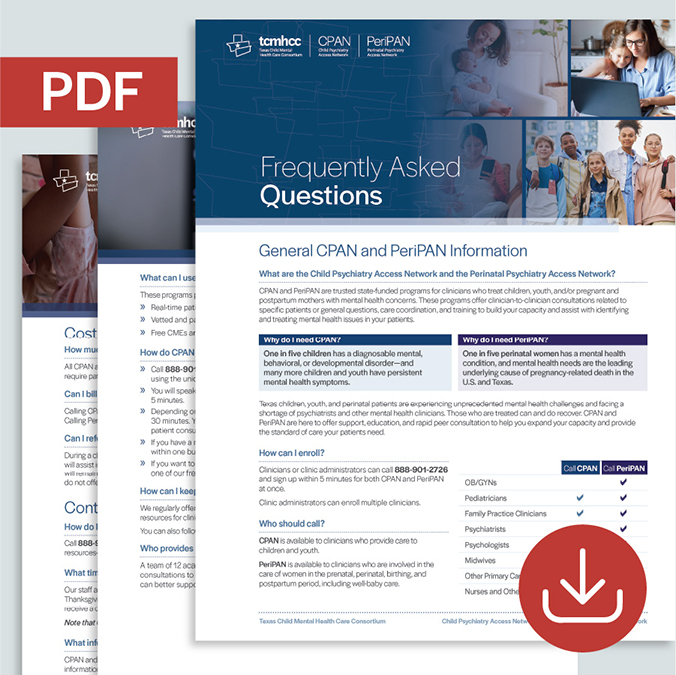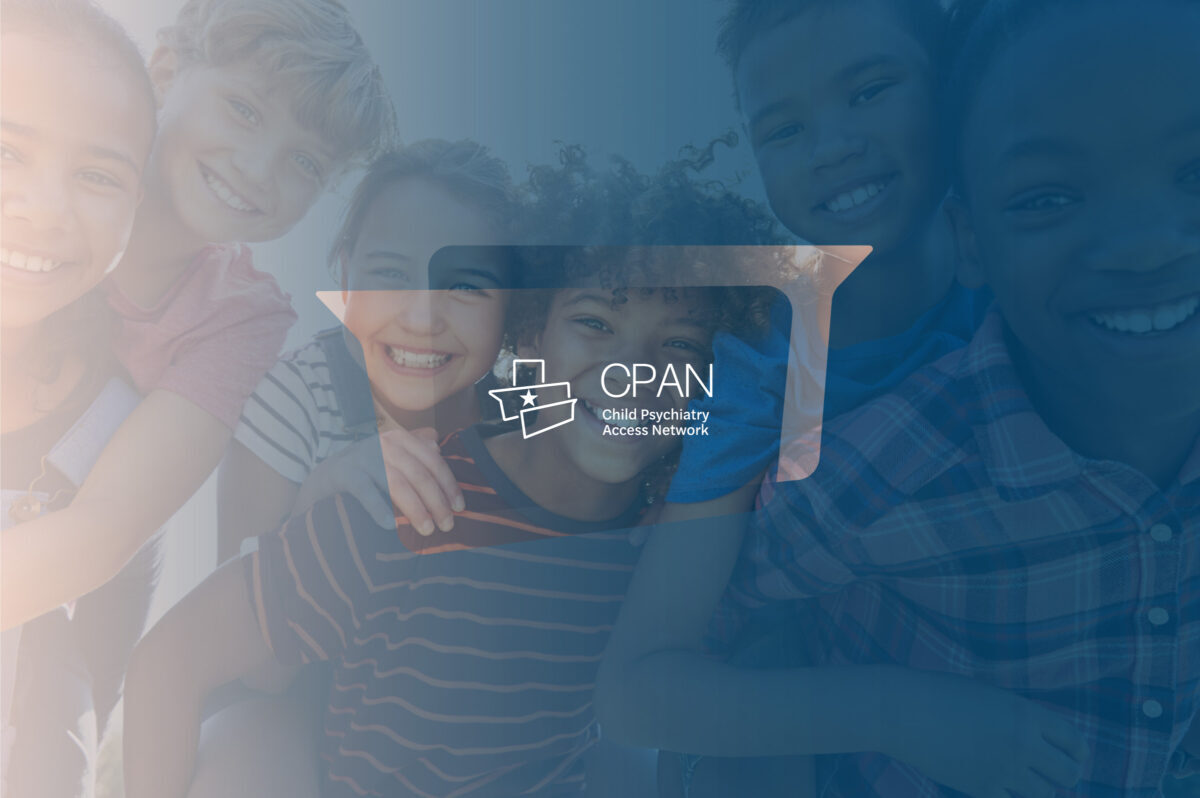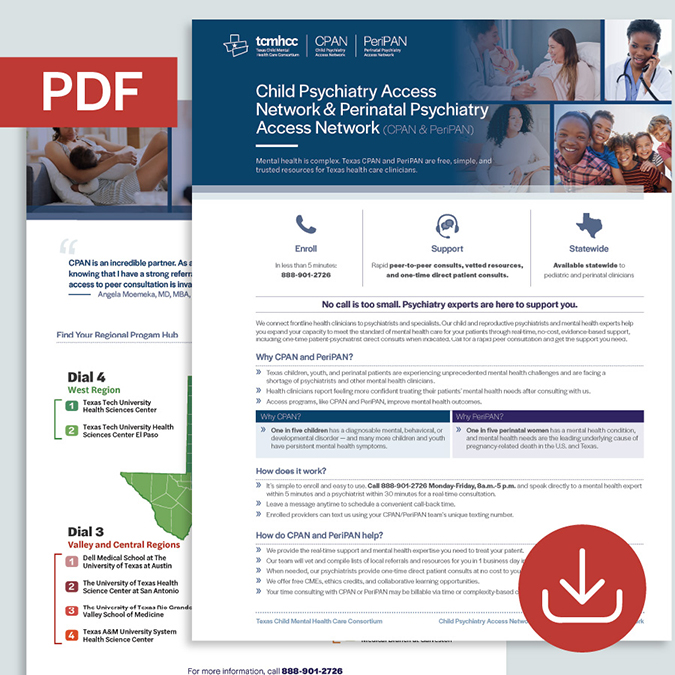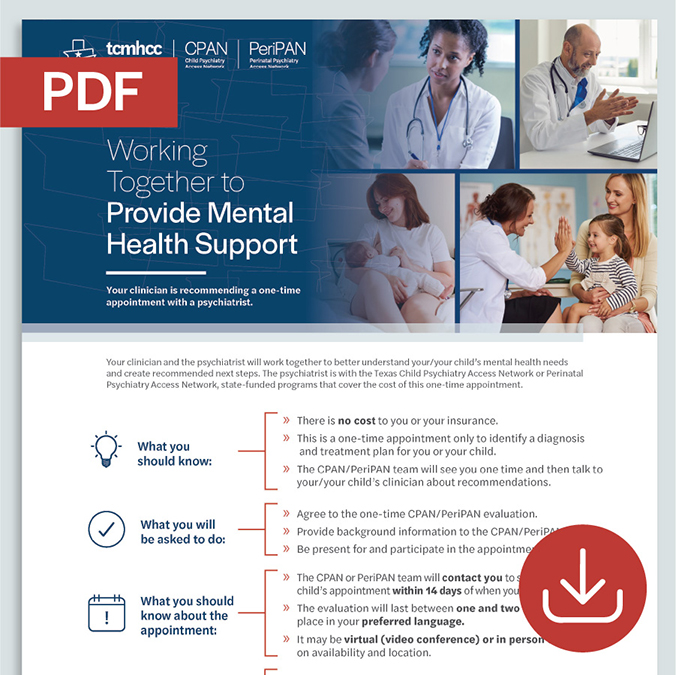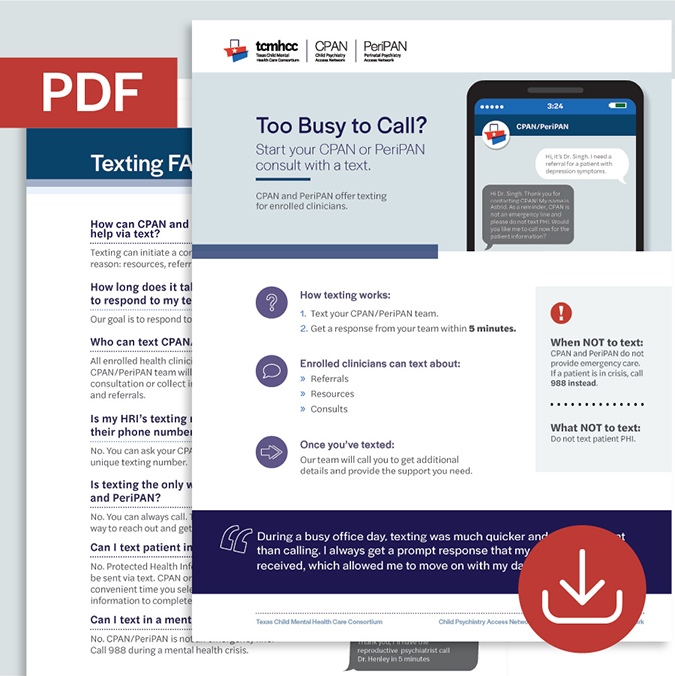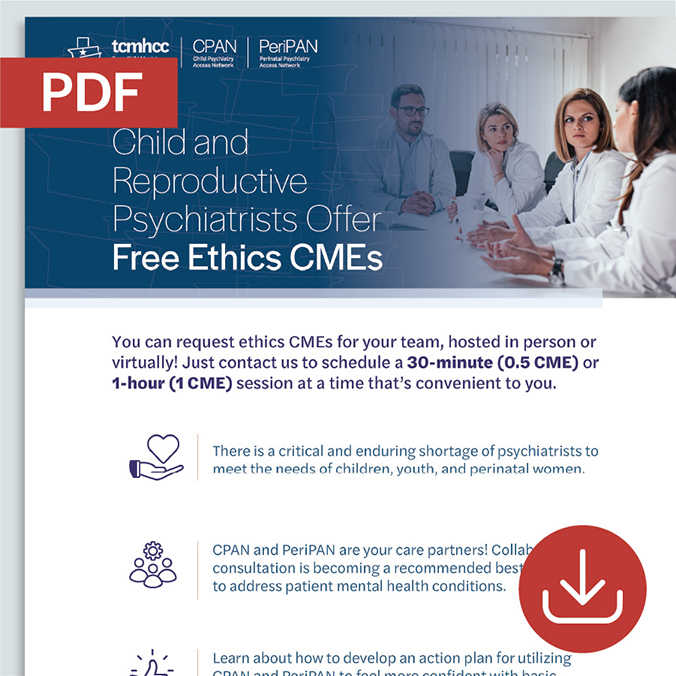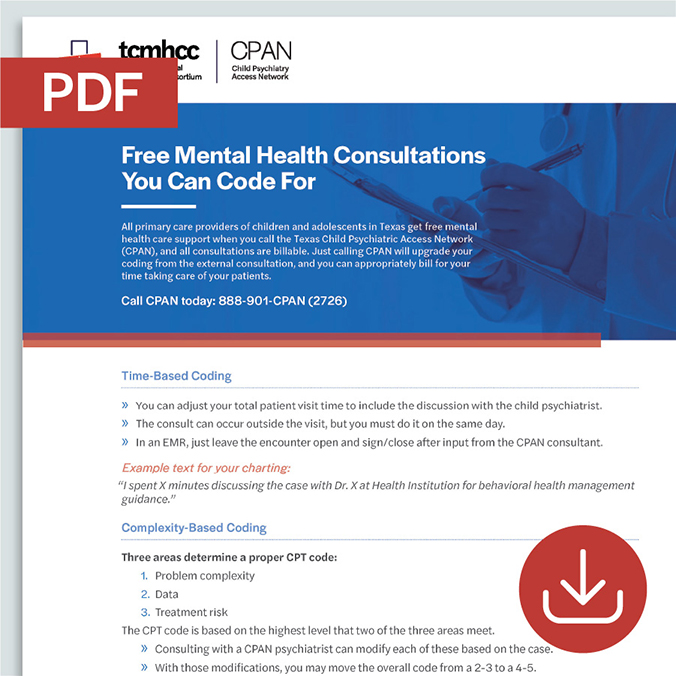Child Psychiatry Access Network (CPAN)
The Child Psychiatry Access Network, CPAN, can enhance child and youth mental health care at your practice and save you time. There is no cost to you or your patients for this evidence-based, clinician-to-clinician program. Texas CPAN offers real-time access to a multidisciplinary network of mental health experts in your region—including child psychiatrists—for peer-to-peer consults by phone, vetted and personalized referrals and resources, and behavioral health CMEs.
Looking for help with a perinatal patient? Call PeriPAN.
Call 888-901-CPAN (2726)No call is too small.
CPAN Helps Pediatric Health Clinicians With Child Mental Health
Learn about real-time consultations that fit into your day.
- “Curbside consultations” on specific patient cases.
- Vetted referrals by patient insurance, location, and specialist availability.
- General questions about mental health care, screening, protocols, medications, and more.
- Training with other clinicians to build knowledge and capacity in child mental health topics.
Why CPAN?
More children and youth need mental health support than ever before, and CPAN is expanding mental health care access for patients up to age 22.
- Families often wait months to see a child psychiatrist when they need treatment immediately.
- Children and families trust their pediatric health clinicians—and see them regularly.
- CPAN is state-funded, so there is no cost to clinicians or families.
- Your time consulting with CPAN may be billable.
- We are here to support you and save you time.
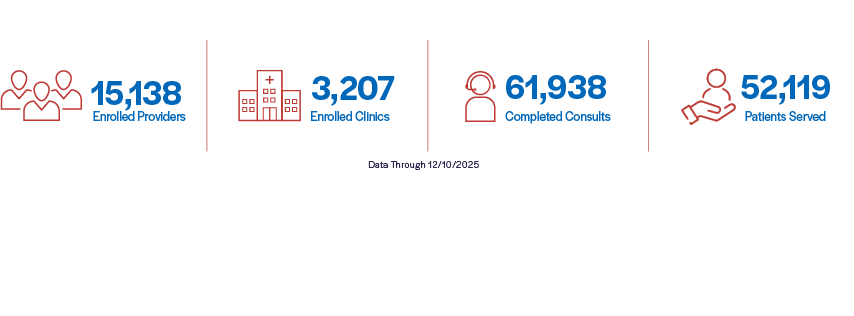
How Does CPAN Work?
It’s simple to enroll, easy to use, and completely free. Call 888-901-CPAN (2726) to enroll within 5 minutes and get help with a patient quickly. No call is too small.
- Reach a mental health expert within 5 minutes. Call or text to start your consult as you move between patients in your busy day, or during your admin time.
- A child psychiatrist will call back within 30 minutes or at a time of your choosing.
- We’ll send vetted, local, and individualized referrals within 1 business day.
- Our team is here Monday-Friday, 8 a.m. to 5 p.m., and we follow up on after-hours messages the next business day.
- Call as often as you need.
How to Enroll
Clinicians can call and enroll within 5 minutes. Clinic administrators can enroll multiple clinicians. Join Texas CPAN. |



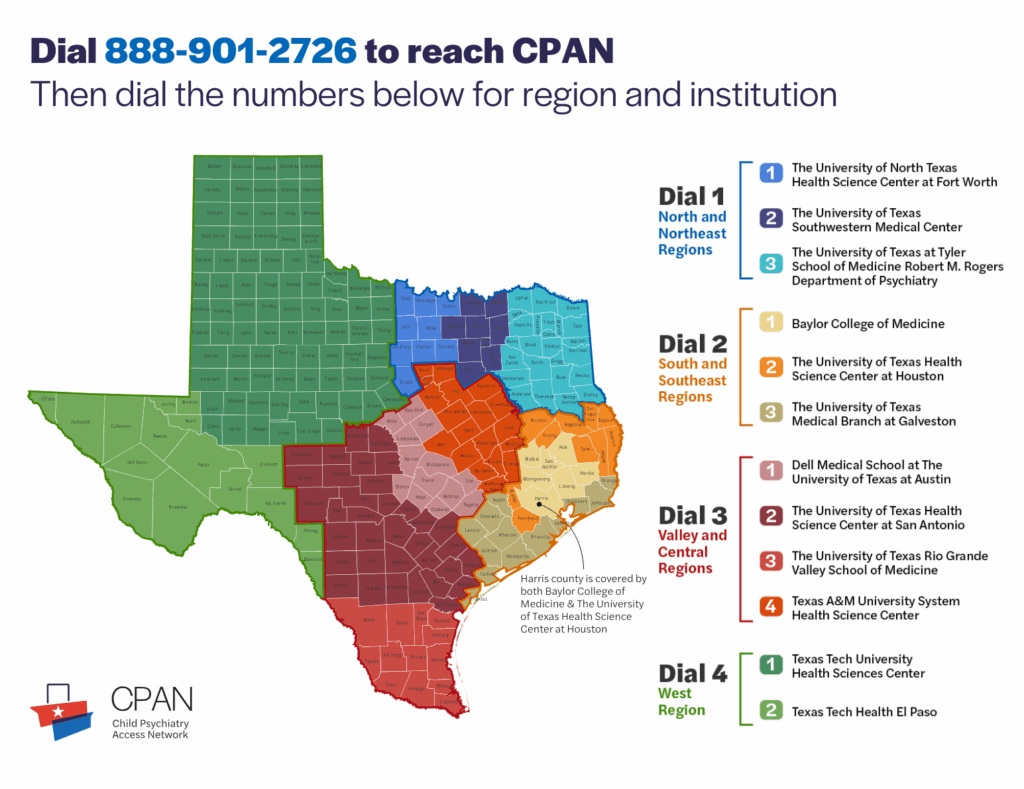
Click here to download the map as a pdf. Interactive map coming soon! |
Resources for Clinicians
ADHD
Attention deficit hyperactivity disorder (ADHD) is the most common neurodevelopmental disorder in the world and one of the most common disorders of childhood. It is also one of the most common reasons clinicians call CPAN. We have vetted and compiled practical resources to assist you in caring for patients with ADHD symptoms and diagnoses.
ADHD Resources for Clinicians and Families
Resources for Clinicians
- Texas Children’s Health Toolkit
- American Academy of Pediatrics ADHD toolkit
- Clinical Practice Guideline
- JCCAP summary article on evidence-based psychosocial treatments for children and adolescents with AD/HD
- American Academy of Child and Adolescent Psychiatry ADHD Resource Center
- American Professional Society for ADHD and Related Disorders
- ADHD Clinical Pearls (MCPAP)
- ADHD Medication Visual Guide
- ADHD Medication Guide and Algorithm (see pages 15-16 for doses/ formulations)
- Comprehensive Care Pathway for ADHD: The AAP Algorithm
- Webinar on Updated AAP Guidelines (Nov 2019)
- How to Optimize Stimulant Medication for ADHD
Resources for Parents, Children, and Youth
- Facts for Families
- CHADD’s review of AD/HD and COVID-19
- Parent training in behavior management for AD/HD
- Strategies to support children with AD/HD at home or in the community
- Free online course for evidence-based parent management training
- National Alliance on Mental Illness
- National Attention Deficit Disorder Association
Visit our ADHD page to learn more.
Anxiety
While anxiety is a normal biological response to a threat or other stress, it can develop into a mental health condition when it persists and interferes with a child’s functioning in daily life. Consult with CPAN and the targeted clinical resources we have assembled below to expand your knowledge and capacity to identify and care for children and youth with anxiety disorders.
Anxiety Resources for Clinicians and Families
Resources for Clinicians
Resources for Parents, Children, and Youth
Visit our Anxiety page to learn more.
Depression
Depressed mood is common among children and adolescents, especially after stress or traumatic events, and a portion of patients experience persistent symptoms. The experts at CPAN and the vetted resources we have collected below can help you screen for depression and make a care plan with families.
Depression Resources for Clinicians and Families
Resources for Clinicians
- Bright Futures
- Bright Futures Presentations and Handouts
- Bright Futures Guidelines for Health Supervision of Infants, Children and Adolescents, 4th Edition
- McPAP Guidelines and Clinical Pearls for Anxiety, Depression and ADHD
- McPAP Depression Algorithm
Resources for Parents, Children, and Youth
- AACAP Depression Resource Center
- AACAP Facts for Families: The Depressed Child
- AACAP Facts for Families: Comprehensive Psychiatric Evaluation
- AACAP Facts for Families: Psychotherapy for Children and Adolescents Part I
- AACAP Facts for Families: Psychotherapy for Children and Adolescents Part II
- AACAP Facts for Families: Psychiatric Medications Part I
- AACAP Facts for Families: Psychiatric Medications Part II
- AACAP Facts for Families: Psychiatric Medications Part III
- Medication Guide for Treating Depression
- AAP Depression and Suicide Web Page
This site contains brochures, fact sheets, and quick facts regarding depression and suicide - National Institute For Mental Health: Teen Depression
- American Family Physician: What to Do If You Think Your Child Is Depressed
- The Depression and Bipolar Support Alliance has printable materials that may be downloaded and printed. These include pediatric bipolar fact sheets and information.
- For extensive family information including parent guides visit the Families for Depression Awareness at www.familyaware.org
- National Suicide Prevention Hotline
Visit our Depression page to learn more.
Suicide Prevention and Safety Planning
Suicide can be a challenging topic for clinicians, but every visit is an opportunity to screen patients for risk. We are here to help you be more prepared to identify suicide risks and create safety plans with families. CPAN can also help you develop protocols and identify resources to plan for crisis situations. We have several resources specific to the needs of clinicians and pediatric health practices to get you started. CPAN does not provide emergency care. Make sure your patients and their families know to dial 911 or the 988 Suicide & Crisis Lifeline during a mental health crisis.
Suicide Prevention and Safety Planning Resources for Clinicians and Families
Resources for Clinicians
- AAP Blueprint for Youth Suicide Prevention
- AAP Risk Factors, Protective Factors, Warning Signs of Youth Suicide
- AAP Strategies for Clinical Settings for Youth Suicide Prevention
- AAP Conducting a Brief Suicide Safety Assessment
- AAP Screening for Suicide Risk in Clinical Practice
- AAP Additional Resources for Suicide Prevention
Resources for Parents, Children, and Youth
Trauma, Grief, and Healing
Trauma responses can occur when a painful, dangerous, or scary event happens to a child, family, or community—and it takes time to heal. This includes one-time events or ongoing situations such as abuse. While not all children and youth will develop trauma symptoms, many will and it is helpful to know how to identify and treat trauma responses, understand grief, and know how to build resilience in children, youth, and families to protect them in the future.
Trauma, Grief, and Healing Resources for Clinicians and Families
Resources for Clinicians
- Childmind.org: Helping Children Cope after a Traumatic Event
- National Alliance for Children’s Grief
- Sesame Street Resources for Trauma exposure
- After the Injury—website for families with injured children
- Sesame Street: Feeling Safe
- Sesame Street: Grief and Loss
- Speaking Grief
- After a Crisis: Helping Young Children Heal
- Helping Young Children with Traumatic Grief: Tips for Caregivers (En Español)
- Helping School-Age Children with Traumatic Grief: Tips for Caregivers (En Español)
Resources for Teens
Resources for Parents and Adults
- Assisting Parents/Caregivers in Coping With Collective Traumas
- TEA Trauma-Informed Training Series
- Guiding Adults in Talking to Children about Death and Attending Services
- Pause for a Moment (PAM) activities
- National Parent Helpline (1-855-4A PARENT, 1-855-427-2736)
Resources for Educators
Resources for Providers
Continuing Medical Education (CMEs):
See one, do one, teach one. CPAN offers free educational opportunities to pediatric clinicians in Texas through timely virtual CME events and a Project ECHO series. These are designed to expand your knowledge on important child mental health topics and connect you with other clinicians in your region as you learn. |
Downloadable Program Resources:
Find and explore resources about CPAN program features, such as texting, direct consults, and how to bill for your time consulting with us. We also have Spanish translated materials available. |
